Rising to the occasion
Featured Stories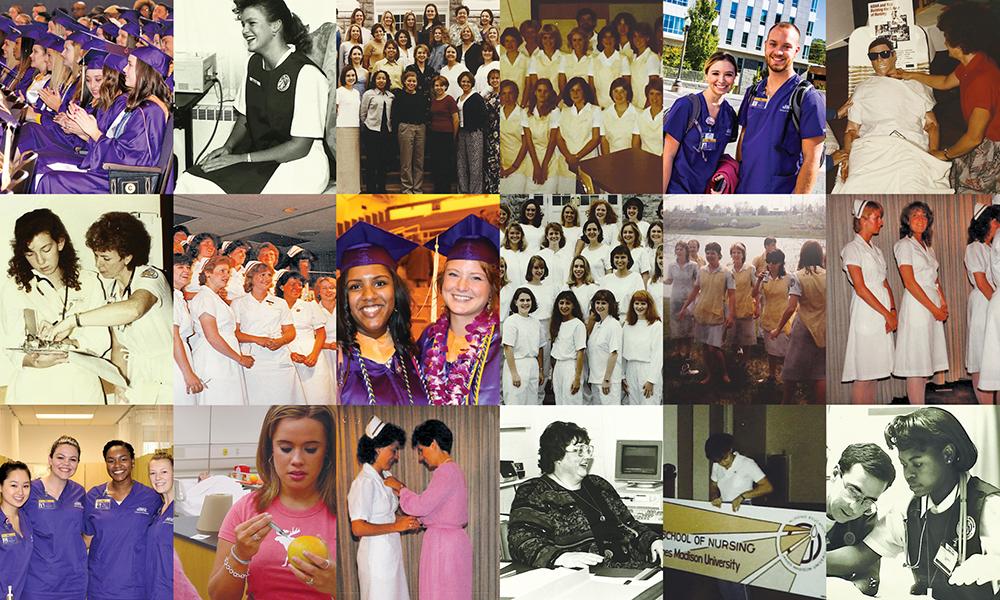
SUMMARY: From programming to professional development to the COVID-19 pandemic, the JMU School of Nursing has been meeting the needs of a changing field for 40 years.
By Amanda Christian (’20)
If we’ve learned anything in the past year, it’s that nursing matters.
Nurses have responded to the global health crisis with courage and compassion, sacrificing so much to be heroes on the frontlines. JMU nursing students and alumni have risen to the occasion to play a critical part in fighting the pandemic in communities across the nation.
When COVID-19 hit, students and recent alumni of the school were thrown into the middle of a crisis and forced to put their knowledge and experience to use in ways they weren’t expecting.
This past summer, senior nursing student Jacob Payne was hired to work in the Virginia Commonwealth University Medical Center. “I worked in supplemental staffing, so I worked on every single floor and it’s a monster of a hospital,” he said. “As difficult as it was, this program has prepared me for it. I felt comfortable and competent, and that’s because of JMU.”
Meghan Schultz (’20) was serving as shelter manager with Open Doors, which supports the Harrisonburg homeless population, when the pandemic hit.
“I wasn’t nervous to work with possibly infected patients due to the fact COVID-19 can be spread anywhere,” Schultz said. “Just because these people are homeless does not mean they are infected, which is a common misconception. JMU has prepared me to care for many patients, no matter what their background or situation is.”
Lauren Marinak (’05) shared a similar sentiment. “My nursing education at JMU prepared me to be resilient and open to the evolving world of medicine. My professors always encouraged us to continue learning and expanding our knowledge base to allow us to be prepared for anything life threw at us, even a pandemic.”
A foundation for success
When the Rockingham Memorial Hospital School of Nursing closed its doors in 1977, JMU stepped in to fill the void.
President Ronald E. Carrier had fervently fought for the development of JMU’s program, drafting a State Council of Higher Education for Virginia proposal in 1972, citing concerns that students might earn their diploma and leave to practice outside of the Valley.
SCHEV finally approved the proposal in 1979, and Marcia Dake was hired as the first department head. The first nursing class was admitted in 1980 and included 21 students and four faculty members.
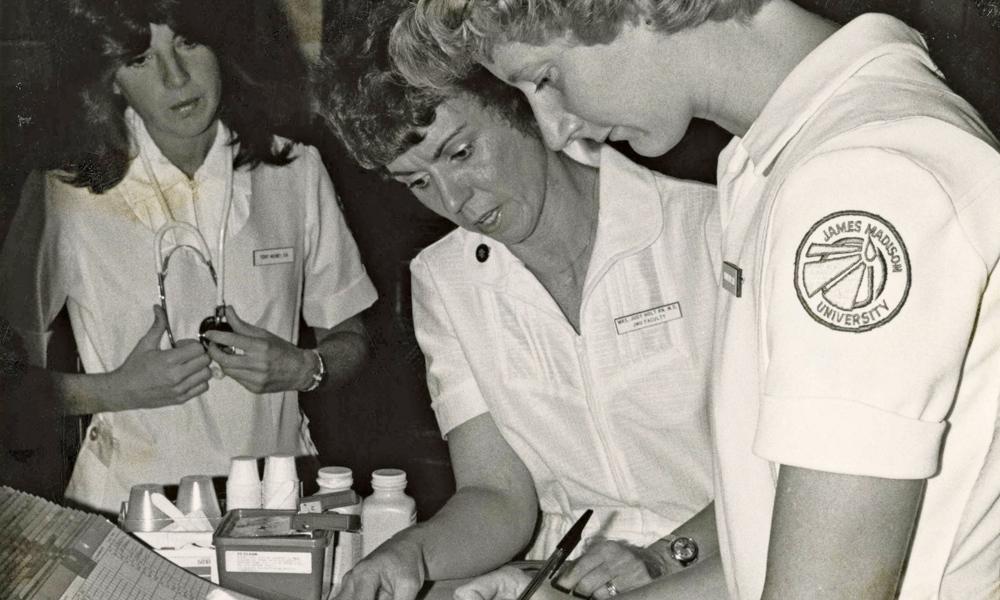 |
| Judith Holt (center) supervises student nurses Terry Mooney (left) and Sharon Liskey as they enter information on a patient's chart. |
Under Dake's direction, the program recruited a talented cohort of faculty members and built rapport with local and state hospitals, as well as other health care organizations.
The current director of the JMU School of Nursing, Melody Eaton (’84), was a member of the third graduating class. “The rigor has never changed—it was an intense program,” Eaton said. “The results, now and then, are that our students are very confident and well prepared to meet challenges head on.”
Eaton did note striking differences in technology and resources. “We only had a few hospital beds and maybe a basic mannequin … nothing realistic like we have now. We practiced on each other—I remember starting IVs on each other—which would not be acceptable now.”
Today, technology is one of the school’s strong suits. The School of Nursing boasts a simulation lab equipped with high-fidelity mannequins and standardized persons; a skills lab, which is used for examinations and resembles a fully functional nursing unit; and a standardized patient suite, where students practice patient interactions and build physical assessment skills.
The early years were rich in tradition. After the capping ceremony, nursing students would jump into Newman Lake in full uniform to celebrate the end of classes. While students no longer celebrate the end of the semester with a splash, the pinning ceremony is a momentous occasion for graduating seniors.
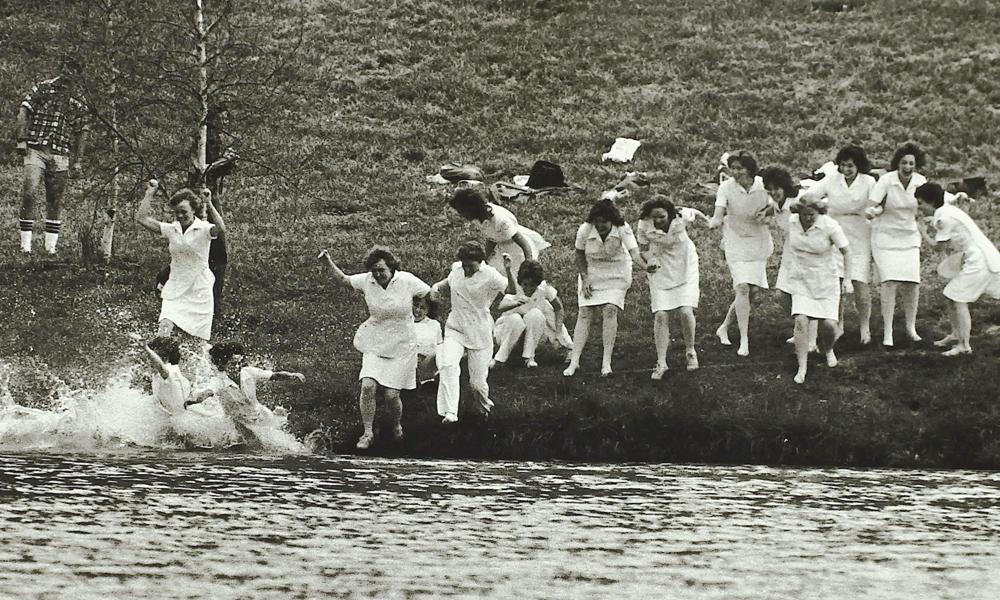 |
| An early tradition of jumping in Newman Lake to celebrate the end of classes was short-lived. |
In 1987, Dake inspired what was then the College of Nursing to also take the plunge. One year before her retirement, she put forth a call for “the need to dare.” The call was described as “the need to have courage, the need to be bold, the need to not be afraid, the need to meet and resist, to face and defy, to venture, to challenge and to be brave.”
Dukes in the community
Vida Huber carried on this legacy and is known for expanding opportunities for community engagement. She helped develop outreach programs such as the Free Clinic, Valley AIDS Network and the Blue Ridge Area Health Education Center.
Huber also founded JMU’s Institute for Innovation in Health and Human Services, which helps facilitate interdisciplinary learning opportunities for students in nursing, social work, psychology and medicine to work together on projects to improve community health infrastructure.
Her commitment to the community has inspired faculty and students over the years to keep pushing the envelope in providing quality service to rural and underserved populations.
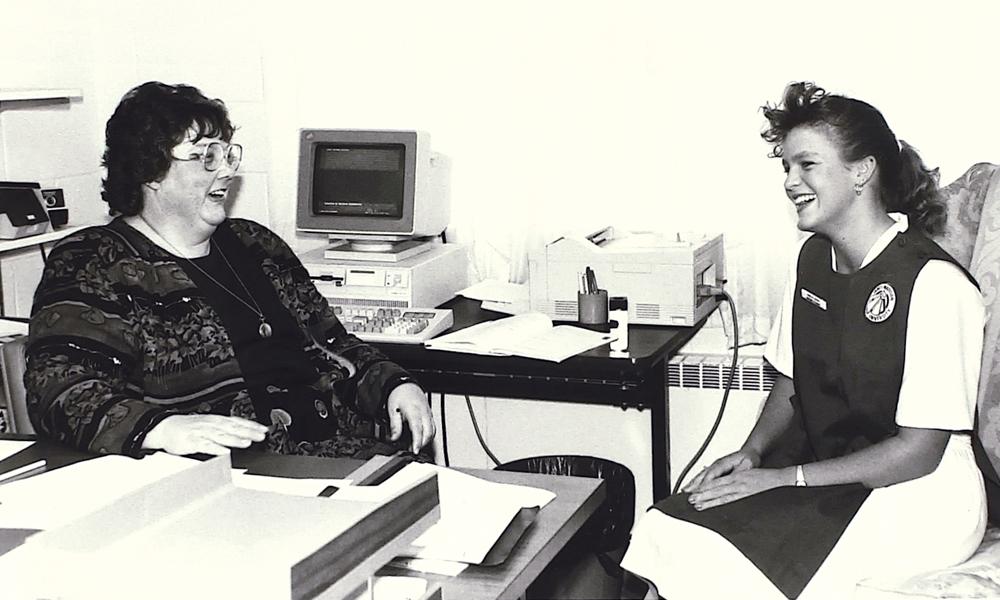 |
| Vida Huber, who led the nursing program from 1988-99, meets with a student in her Harrison Hall Annex office. |
The Suitcase Clinic, a collaboration between IIHHS and the Harrisonburg Community Health Center, sets out to improve the health of the local homeless population. It provides on-site urgent care services, chronic illness management and preventative care. Rather than the program functioning within a permanent clinic setting, the supplies can be transported in a suitcase on wheels from shelter to shelter. The clinic is staffed by one full-time nursing case manager and numerous volunteer providers, including JMU nursing students.
The Undergraduate Primary Care and Rural Education Project is another community-based program where students can practice their skills while supporting and improving health education and services in neighboring Page County, Virginia. JMU received the grant to pilot the program in June 2018 and has since expanded to accommodate more students in their clinical experiences.
|
"Here we talk about things that have to do with health care right now and what we’re going to walk into once we graduate." — Gabrielle Futrell, nursing student, UPCARE scholar |
Payne, a fourth-semester nursing student, Page County native and UPCARE Scholar, said, “It’s been great, and it means so much to gain hands-on experience while helping those in my community.”
In giving back to the community, students are able to gain more diverse and hands-on experiences, ultimately contributing to their development into well-rounded nurses.
“Unless you’re out in the community and gaining that clinical experience, it’s really easy to just learn the material,” said fourth-semester student and UPCARE scholar Gabrielle Futrell. “But here we talk about things that have to do with health care right now and what we’re going to walk into once we graduate.”
This application-driven approach sets the School of Nursing apart, particularly because JMU is situated in a region of underserved communities with opportunities to make a difference.
“You can learn a skill in a day,” Eaton said. “What our program really does is it promotes critical thinking and builds a strong enough base of understanding to apply it. Everything we teach, we apply it in our program. We apply it in our community.”
Perhaps Huber said it best—service makes nurses, and people, more whole. “Service is at the heart of my philosophy of life, and I believe that it is through service to others that we ourselves become more whole,” Huber said upon receiving the James Madison University Citizenship Award in 2002.
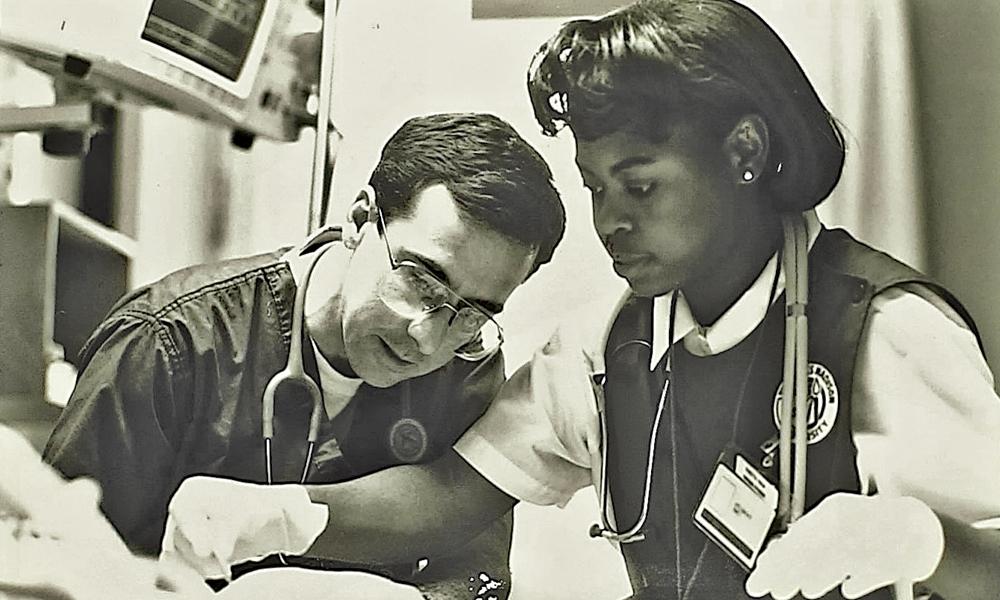 |
| Art Strunk ('92), Merck Scholar Award recipient, guides a student's clinical study. |
‘Years of enormous change’
When Huber became an associate dean, Merle Mast took over as academic unit head. Her vision was to eventually expand graduate programs and develop a RN to BSN program to provide a pathway for graduates of community college or diploma schools with a registered nurse license to obtain their bachelor’s degree. But a looming nationwide nursing shortage sped the expansion process.
“These were years of enormous change,” Mast said. “As the nursing shortage intensified and JMU continued to expand, the university joined a statewide initiative to increase baccalaureate nursing program capacity. In 1999, we graduated about 40 new nurses, but we quickly began working on strategies to double, and then to triple our graduates.”
The expansion was done carefully.
|
"We're producing really excellent nurses that are well known up and down the East Coast for their ability, their critical thinking and their skills. People come to our [job] fairs and they want our students." — Karen Jagiello ('06), professor, RN to BSN director |
“The beautiful thing about JMU is that we understand the expansion has to be planned. It has to be done in such a way that it grows, but doesn’t outgrow what we’re trying to do,” said Karen Jagiello (’06M), professor and RN to BSN program director. “We are intentionally careful with our forward movement so that we don’t get carried away and do more than we can handle. Through it all, our mission and values continue to align with the university.”
Classes are offered asynchronously and online so students can maintain employment while taking courses. The program launched in 2006 with eight students, and since then, 413 nurses have earned their degrees.
After 20 years of practicing, Jagiello realized that her own growth as a nurse had halted. “It’s like I hit a wall until I went back to get that degree,” she said. “In the last 15 years, it has become really imperative that nurses don’t just stop their education. They continue to grow and become lifelong learners. If I can do it, anyone can do it.”
The School of Nursing fills vacancies in the health care field, but more importantly, it fills them with qualified and well-rounded nurses. By expanding program offerings and making degrees more accessible, JMU produces nurses that are ready to make an impact on day one.
“We’re not just churning out nurses. We’re producing really excellent nurses that are well known up and down the East Coast for their ability, their critical thinking and their skills,” Jagiello said. “People come to our [job] fairs and they want our students.”
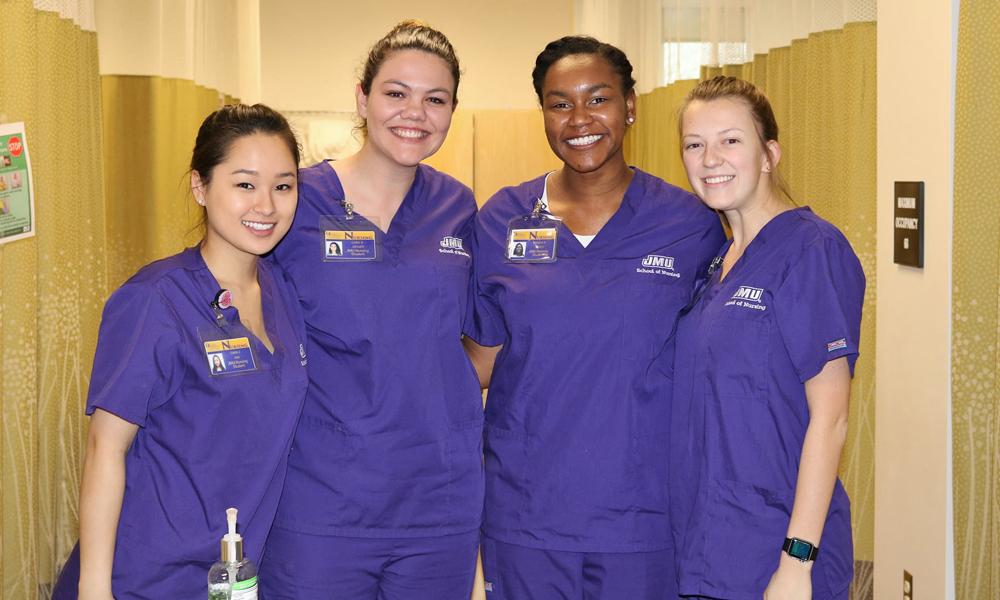 |
Global perspectives
Beyond the classroom and the community, JMU nursing students have a wide variety of opportunities in which to apply their learning. In addition to several semester study abroad programs, there are well-established summer programs in Costa Rica, Spain and Tanzania to choose from. Previous study abroad trips included stops in Japan, Malta and Russia.
While the pandemic has halted recent trips, the School of Nursing continues to cultivate new relationships with organizations to expand the already robust program. In February 2020, on the cusp of a pandemic, administrators traveled to the Cayman Islands to finalize plans for a new partnership. They’re also currently working with representatives in Limpopo, South Africa, to get a program off the ground in the near future.
Kendall Madison, a senior nursing student and president of Nursing Students Without Borders, traveled to Costa Rica in December 2019 with the organization. She considers the trip the highlight of her nursing education.
“It’s one of my absolute favorite memories from JMU—getting to work alongside all those people and see their vulnerability to open up and accept us into their community,” Madison said. “Being completely immersed in another community’s culture changes your whole perspective of nursing—what it really means to people and how much you can impact their lives just by a simple interaction.”
Study abroad affords students the ability to explore new cultures and gain new perspectives that help shape their future experiences. However, study abroad in the School of Nursing is unique because students are asked to use their knowledge and critical thinking skills to address challenges in health care infrastructure that, in some cases, vastly differs from systems in the United States.
“It makes you stronger as a nurse, builds your teamwork and forces you to use clinical judgment in a different setting,” Madison said. “And so, JMU does prepare us in the classroom, but this is just another way to enforce and solidify your skills.”
Serving the nation
On top of an already rigorous academic workload, nursing students in the Army ROTC program have to balance an even more demanding schedule. While the experience may be trying, these students leave JMU equipped to provide exceptional health care to service members and their families.
Specifically, ROTC works with the School of Nursing to provide supplemental leadership and military training that prepare students to be compassionate and skilled leaders in the industry.
|
"I believe my nursing career benefited from the challenges I faced as an ROTC student and made me the officer I am today. I am forever indebted to JMU and the nursing school for giving me the opportunity to pursue both the military and nursing.” — Capt. Abigail Fredericksen Webber ('13), U.S. Air Force |
“I can’t think of a better field than nursing that embraces the Air Force culture,” said Capt. Abigail Fredericksen Webber (’13). “Although it was challenging at times to balance the early-morning runs up and down the stairs of D-Hall, followed by an 8 a.m. test in anatomy, I believe my nursing career benefited from the challenges I faced as an ROTC student and made me the officer I am today. I am forever indebted to JMU and the nursing school for giving me the opportunity to pursue both the military and nursing.”
The School of Nursing has a memorandum of understanding with Army ROTC and Air Force ROTC to guarantee a minimum number of seats for students who meet the requirements. Often, there are more than the minimum number of ROTC applicants who are admitted based on their own merit without the additional consideration.
The success of the program is reflected in national recognition. The Army charged JMU’s program with a Nurse Commission mission that reflects the quality and professionalism of the Duke Battalion and the nursing cadets who graduate from JMU.
Nursing Army ROTC cadets also are offered opportunities to apply their learning in hands-on summer programs. The Nurse Summer Training Program is a paid, three-week program that assigns cadets to Army hospitals throughout the U.S. and Germany. The program introduces students to the Army Medical Department and exposes them, firsthand, to the roles and responsibilities of an Army Nurse Corps Officer.
ROTC nursing majors optimize the sense of service and commitment that so often characterizes the School of Nursing.
Paving the future
When Julie Sanford took over as director in 2011, the School of Nursing had just undergone massive growth—adding the MSN, RN to BSN and Doctor of Nursing Practice programs. But the growth didn’t stop there.
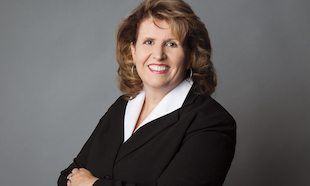
Sanford was particularly proud of how the school developed faculty during her tenure, which resulted in faculty and enrollment numbers nearly doubling from 2006 to 2014. “Investment in people is the most critical step you can take as a leader,” Sanford said. “It’s really cyclical ... Investment in one group leads to investment in the next, and ultimately, the best health care for our patients, families and communities, which is my priority goal as an academic nursing leader.”
The School of Nursing encourages faculty to innovate and keep up with the changing demands of the profession. Professor Erika Sawin (’20M) said this thirst for innovation transfers to students, noting the school doesn’t produce “cookie-cutter” nurses.
“There’s a real spirit of innovation that exists,” Sawin said. “If you have an idea, the leadership is supportive of you to be able to take that idea and run with it. There’s so much creativity here.”
The spirit of innovation is complemented by the steady addition of professors who come from varied backgrounds and who challenge students to learn beyond the status quo.
As the program expanded, the school began to receive more recognition across the state and the nation. Recognitions include:
-
#12 BSN (College Resource Network Nursing Schools Nationwide Best Colleges)
-
#6 RN to BSN (30 Best Value Colleges for Nursing in the South)
-
#1 registerednursing.org (2019 Best Online RN to BSN Programs in Virginia)
-
#82 MSN Program (U.S. News & World Report)
-
#61 Best On-Line Graduate Nursing Programs (U.S. News & World Report)
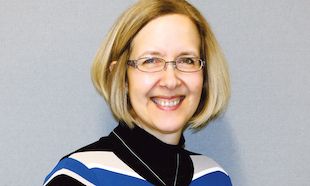
Since becoming director in 2019, Eaton has focused on strengthening the advocacy arm of the school and equipping students with the knowledge and confidence to be leaders in their workplaces, communities, states and beyond. Students at each level are exposed to government policy and advocacy.
BSN students participate annually in the Health Policy Summit, where they work to develop solutions to issues affecting health and then present their resolutions to local legislators. Each semester, student groups evaluate current bills before Congress relating to opioid crisis prevention, and the top three solutions are presented to lawmakers. RN to BSN students research a particular bill and draft a letter to their representative in support or in opposition to the policy.
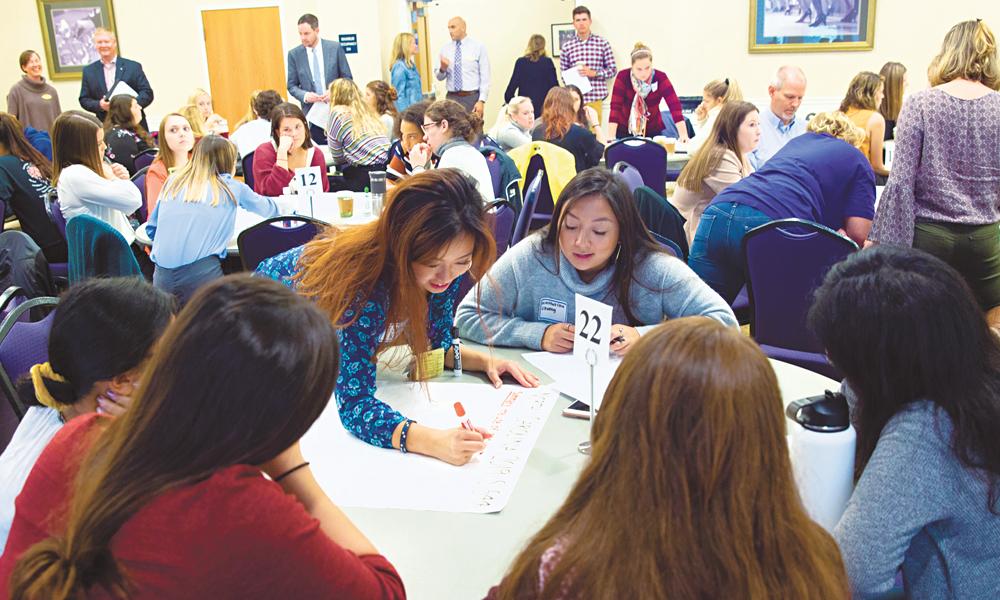 |
| BSN students work in interdisciplinary teams at the Health Policy Summit in 2017. |
“Hill Day” is an opportunity for graduate students to visit the state capital or nation’s capital to present on health care-related legislation. All nurse practitioner students participate in the Virginia Council of Nurse Practitioner’s conference, which is a state NP political advocacy organization. At the DNP level, students participate in the weeklong Health Policy Institute, where students are introduced to a variety of health policy organizations in Washington, D.C.
“It’s all about educating our students to be advocates for clients, communities, population health—and not being afraid to take a stand and go see their legislator, or be a legislator one day, run for office,” Eaton said. “We need more nurses making decisions in our country.”
Since its formation in 1980, the School of Nursing has been adaptive and conscious of evolving needs and expectations affecting the health care field. In 40 years, the school has risen to each occasion—a nursing shortage, expectations to obtain advanced degrees and now, a pandemic. In 2020, nursing matters more than ever.
“We have a history of being innovative and living out the mission of the university—Being the Change,” said Eaton. “We’ve embraced growth when it was needed, and we’ve really met the needs of the commonwealth and the nation. We have 40 years of excellence, and it’s only the beginning.”
*Special thanks to the School of Nursing faculty and staff for their contributions. For more information, check out the 2020 School of Nursing magazine.

